
Over 320 abstracts were submitted to the SA Basic Education Conference from teachers, principals, academics, government, non-government organisations, and the corporate sector, and IkamvaYouth’s submission has been selected as a poster presentation on 2 April. Zamo Shongwe and Joy Olivier will be representing the ikamvanites at this event, and are looking forward to learning, sharing and connecting with the conference delegates from all sectors. Professor Metcalfe, the conference chair, said that “it is very encouraging to see the creative and innovative ideas coming from teachers and principals at the coal-face of basic education”, and we’re looking forward to being a part of it.
IkamvaYouth’s poster presentation will be uploaded here in the coming days, together with background information, references and acknowledgements. We hope that readers will engage with it and send us your comments and questions via the facebook comment functionality below.


IkamvaYouth is speedily setting about garnering the support and partnerships we need to establish more branches across the country. Our results come with the responsibility to replicate, and while our high impact model is also low cost, scale is nevertheless expensive.
IkamvaYouth is also very fortunate to be supported by visionary donors who’re providing the means we need to grow in the face of the overwhelming need for our services. However, in looking far forward into the future of our organisation, we’re planning to create an income stream that is directly related to our key assets: the wonderful ikamvanites. Our first step in this direction was a brainstorming workshop held in April last year, facilitated by Freda Gray.
Now, with generous support from the Bertha Foundation, IkamvaYouth is working with Mindstir, an innovation company, to develop a social enterprise who’s aims align with the organisation’s key mission of enabling ikamvanites to access post-school opportunities, which would also generate profits, to be donated to IY.
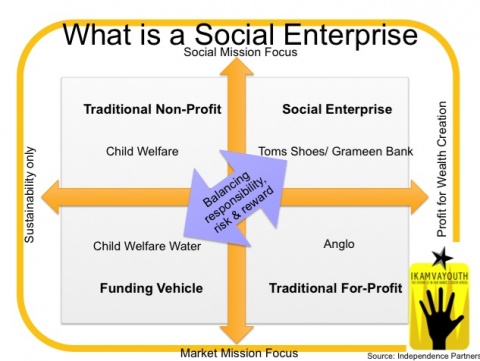
The current thinking is around linking BBBEE Skills development contributions to student loans, bursary programmes, learnerships and internships. Business struggles to find the right students to support: they mostly recruit students via campus exhibitions/ advertisements but receive loads of applications and it is costly to sift through them, get aptitude tests done and eventually when they select the students they will sponsor, they are not sure if the relationship will work. Businesses have to spend money on “institutional based theoretical instruction” as it contributes to the Skills Development points they can earn to make up their BBBEE score.
As IkamvaYouth works closely with committed learners who prove themselves over many years, the organisation can provide these businesses with an attitude indication and develop a way to match students with corporates.
One potential solution is to provide a service to corporates similar to that where foundations manage CSI spend for companies, but focused on bursaries and student loans. Corporates would pay us a small management fee and this enterprise takes the pain and cost of recruiting students as well as reduced risk that these learners will drop out of tertiary.
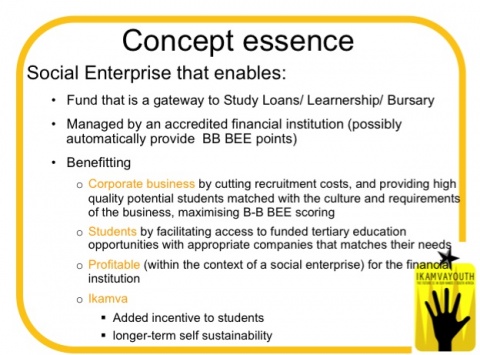
On 3rd February, Freda Gray and Anneke de Bod facilitated a scoping session where ikamvanites and key supporters collectively brainstormed the concept and set the scope for the pre-feasibiliy study. Ikamvanites were lucky to be joined by IY Chair and MD of TSiBA education, Leigh Meinert; Amrik Cooper from ikapadata; Prof Darren Lorton, Executive Dean of Applied Sciences at DUT; Charles Ainslee from the Learning Trust ; Lolita Barends from Capitec and Susan Godlonton (IY board member and PhD fellow at the University of Michigan); each of whom contribute significantly to supporting and growing IY.
The scope for the pre-feasibility was set, and interviews are currently underway. IkamvaYouth is grateful to all those who’re giving their time to participate, and we’re looking forward to finding out whether our ideas have wheels to hit the road towards self-sustainability.

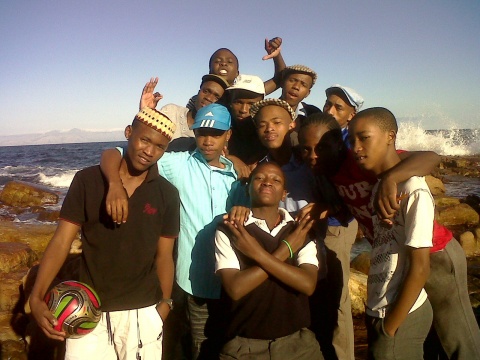
Initiated in July 2010 by the World Teach volunteers, the Masi Man Club’s has been created for answering youth concerns, promoting personal development, supporting collective actions within the Masiphumelele Community.
In 2011, the Masi Man Club’s members have been really active in supporting people who have been affected by the fire in May 2011. In fact, they volunteered their time to help carry building material and rebuild houses.
The format of each session answers 3 requirements:
– To be outside of the Library or outside the Community,
– To have a physical activity through sports or collective games,
– To provide time for a topic discussion.
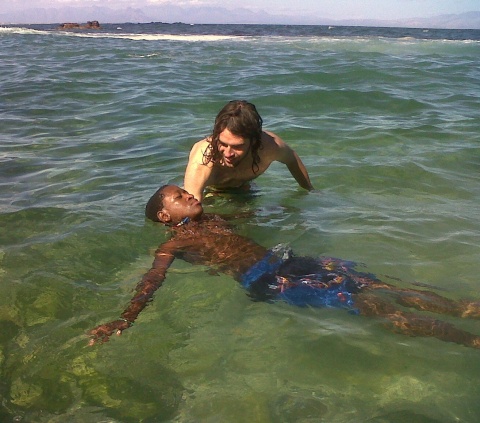
Nick Jones, history teacher and tutor at the Masiphumelele Branch, took over the Masi Man Club to propose a space where Ikamvanites can raise their concerns, express their opinions; propose solutions in a safe environment.
Members proposed the following topics to be discussed and developed along the year:
– What does that mean to be a Man for me today?
– What are the different kinds of relationships? And how a young man will deal with them?
– Peer pressure and peer support?
– Drug abuse and risks behaviours
– Protected sex.
– Dealing with my emotion.
– Get more information on fire safety, and get skills to answer this issue in the community.
– Career choices
– Hiking
– Repartition of tasks within the members
– Fundraising for the Masi Man Club activities and outings.
To be continued… 🙂
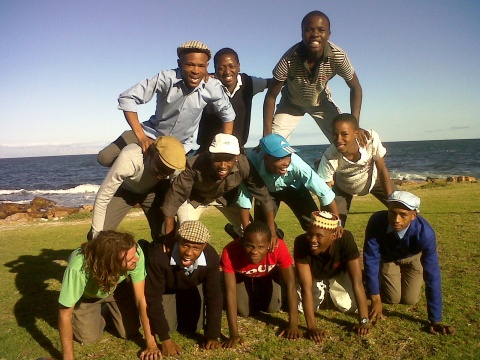

Some awesome news for February 2012 – we’ve just moved our Nyanga branch from the Nyanga Library to the Zolani Centre. Check the pics below for a taste of our new space… we’ve already been busy decorating and are excited to announce that we’re upping the number of young people we’re working with in Nyanga from 60 to 90.
Tutoring is hopefully kicking off next week, but we need your help! We’re in urgent need of desks or tables to help us seat young people during their classes.
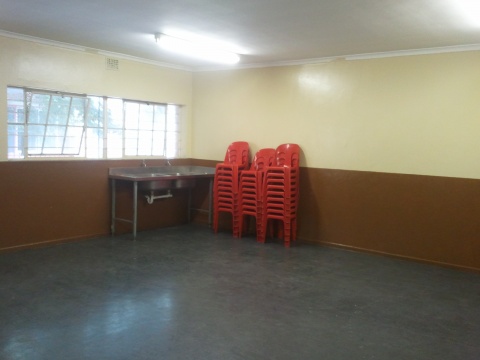
The space is ours to use in the afternoons but is used for other purposes outside of our hours, so we’re looking for some stackable/foldable trestle tables or desks which can be put away outside of class times.
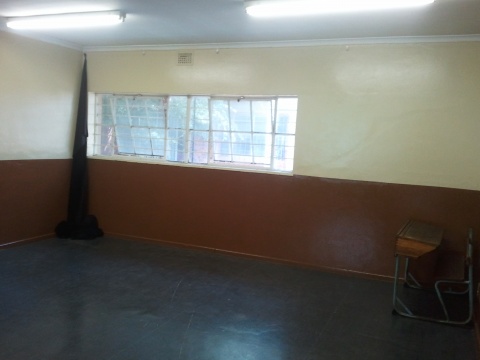
Can you help? If you’ve got any tables/desks you could donate please get in touch with Asanda on asanda@ikamvayouth.org or drop him a line on 07988 54277. Please pass this along to any contacts/networks you think might be relevant – your help is hugely appreciated!
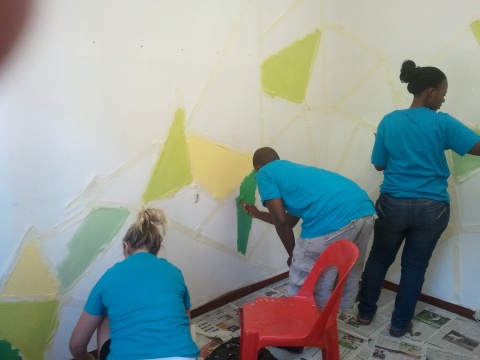
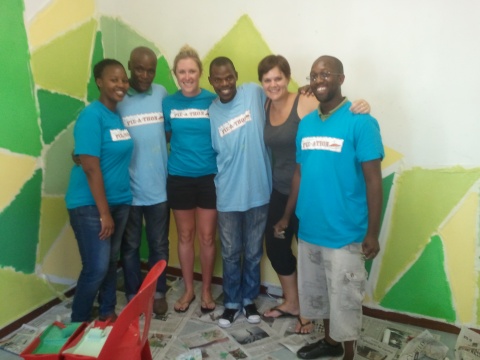
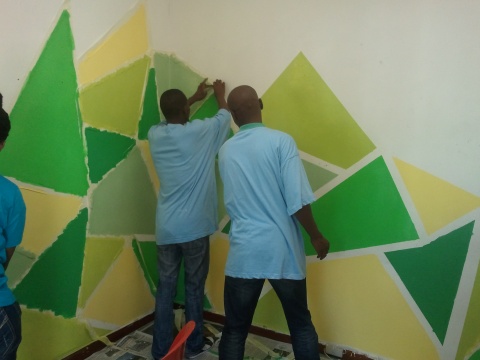

Makhaza branch had an opportunity to pilot a project with Education with Borders (EwB) who aims to provide improved educational opportunities and facilities in disadvantaged regions of the world. EwB focussed on our Grade 8s as the program helps lower grade learners understand basic maths principles.
The Education without Boarders (EwB) program highlights the simplicity of mathematics and emphasises the critical importance of foundational skills while acknowledging the complicated challenges and circumstances of life, which many of IkamvaYouth learners are coping with. This is has been fantastic program that promises to make a profound difference not only in learners’ maths results but also in other areas such as boosting their confidence in their existing abilities. This allows learners to approach new learning experiences with a much more confident focus on learning. And that makes them much easier to tutor.
The two dedicated tutors who gave all their tutoring time to the EwB programme, Nicholas Mei and Braam Daniels say from their experience that while they are essentially tutoring maths they noticed a huge improvement in the confidence and attitude of the learners toward their school work. The environment and culture of IkamvaYouth and the EWB programme creates a holistic approach which rather than just “teaching” learners it enables them to become aware of their inner ability to teach and learn for themselves. So while the focus has been on maths, the deeper things the learners have learned have manifested in all academic areas as it provides these learners with everything they need.
To determine the impact of the program, the class average of maths results achieved by the learners during the year was compared to the average maths result achieved by the entire grade of the two dominant local schools (i.e. Chris Hani High and Harry Gwala High). The comparison is shown below in Figure 1.
Figure 1
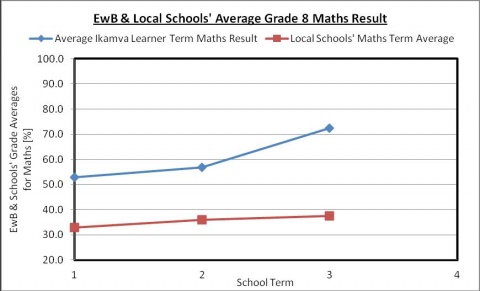
Figure 1: Comparison of the average EWB Grade 8 learner result to the local schools’ average grade result.
Figure 1 shows that not only did the EwB program learners consistently outperform their local schools but they also showed a greater overall improvement in their maths mark when comparing the 1st and 3rd term results. The EWB class’s school maths average improved by 19.6% while the local school only showed a 4.75% improvement.
The EwB programme has played a huge role in helping learners improve academically, not only in mathematics, but it has also trained the learners to be able to approach any kind of question without them struggling. It has helped them gain confidence in approaching maths questions and most of all it has taught them on how to work as a group.
So while sharpening basic math foundation skills with the EwB content and challenging the learners as cooperative groups with basic algebra problems, in a consequence-free learning. The program has already begun to be implemented with the next group of grade 8s in 2012, as well as implementing an English language component and looking to expand to other branched.
Well done to our learners for these amazing results and to EwB
ewb_program_report_iymakhaza_dec2011.pdfewb_program_report_iymakhaza_dec2011.pdf
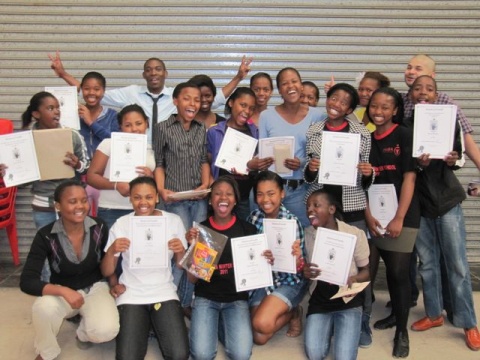
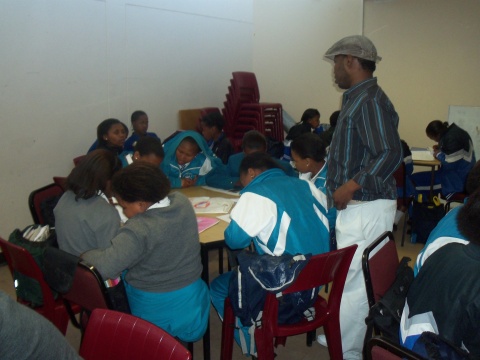

One of Makhaza’s tutors was lucky enough to be involved with Dance4Life and RedZebra Foundation which uses creative facilitation techniques, dialogue tools, bottom up processes as well as music and rhythm to deliver powerful experiences for the young people. The approach is youth friendly and centered around the notion that
Dance for life is a dynamic international initiative that involves young people; it encourages them to use their voices in stopping the further spread of HIV/AIDS and breaking down the stigma and taboos that surround the pandemic. Its approach covers all aspects of popular youth culture: media, language, icons music and especially dance. Dance is a universal language and through Dance4life young people dance with a cause. During the Schools4Life project (visiting schools and run workshops), which is the heart of the concept, they acquire the knowledge and life skills they need to protect themselves, while motivated to inform their peers and take action to improve young people reproduction health and rights.
By involving youth, it’s possible to change not only their behavior but also to mobilize them to create social change in their communities so that others change their behavior and perceptions as well. Dance4Life strives to empower young people to unleash their leadership potential, including young people living with HIV.
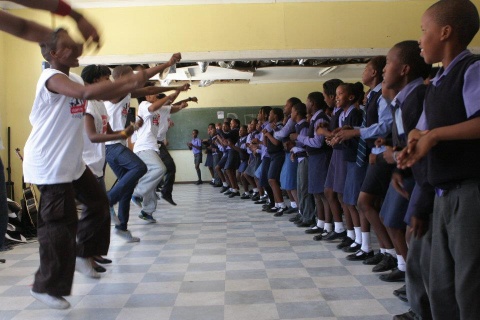
Ayanda Sawulisi, a past IkamvaYouth learner at the Makhaza branch, now a committed tutor participated for the week’s training and has this to say, ‘Well I got involve in the Dance4life project via Ikamva Youth. I got interested in the program because I love to work with young people and being the person that I am who is involved in the entertainment industry, I believe that I can use my skills and elevate dance4life project to new heights.
I also joined because Dance4life’s tool of getting the message across is very unique and inclusive ways though dance, music, spoken word etc which are my areas of interest. The training was great; it was very informative in terms of leadership skills and how to run workshops. It was full of energy, skills exchanging and creativity. Most of all I enjoyed to learn the dance which was the core element of the program and I was blessed to be amongst individuals who are very talented and who are in the virtue of becoming young leaders. The dance will help me in a way that I will be able to teach others but most of all to teach them the message behind the dance and it also help in terms of fitness/health because you sweat very much!’
Big up to Peter Schaupp and RedZebra Foundation for the opportunity!
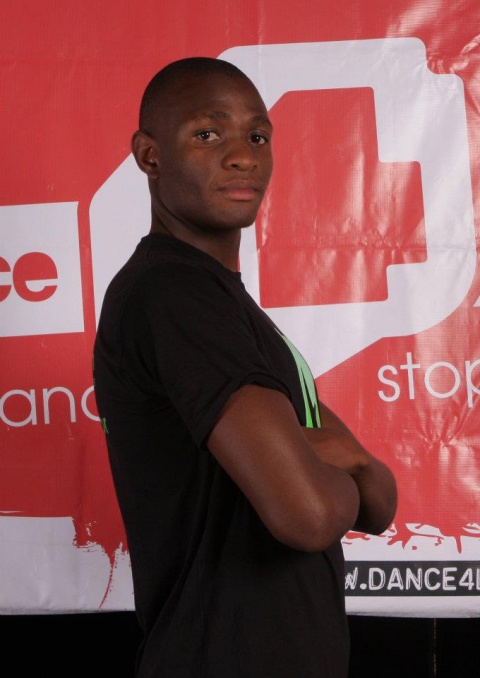























 Lloyd Lungu
Lloyd Lungu